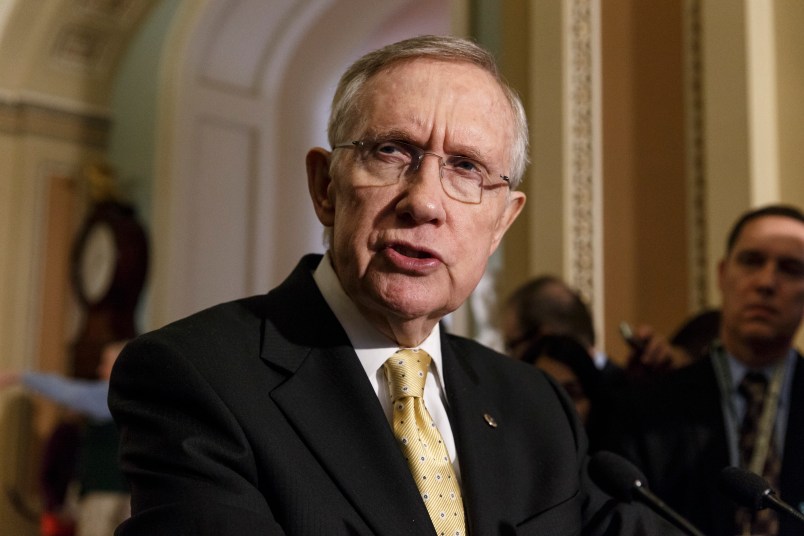WASHINGTON (AP) — Senate Majority Leader Harry Reid said Monday that Republicans may have helped Russia annex Ukraine’s Crimean Peninsula in a surprisingly sharp attack ahead of a test vote on a bill authorizing more U.S. sanctions on Russia and $1 billion in loan guarantees to Ukraine.
Outlining the Senate’s agenda after a one-week recess, the Nevada Democrat said the first item would be the Ukraine bill that Republicans blocked just before lawmakers went on break. He urged Republicans to consider “how their obstruction affects United States’ national security as well as the people of Ukraine” and said their delay of any congressional action “sent a dangerous message to Russian leaders.”
“Since a few Republicans blocked these important sanctions last work period, Russian lawmakers voted to annex Crimea and Russian forces have taken over Ukrainian military bases,” Reid said. “It’s impossible to know whether events would have unfolded differently if the United States had responded to Russian aggression with a strong, unified voice.”
Reid’s charge comes despite widespread support among Republicans and Democrats in Congress for providing Ukraine with much-needed economic assistance and hitting Russian President Vladimir Putin’s government with sanctions.
And GOP Senate aides noted the House has passed different legislation, meaning the Senate bill could not have become law before recess anyhow. They blamed Reid and Democrats for blocking the Senate from taking up the House legislation.
The biggest dispute separating the two chambers appears to be inclusion in the Senate bill of reforms of the International Monetary Fund, which the United States, Europe and others are working with to stabilize Ukraine’s economy. The IMF’s 2010 reforms increase the power of emerging countries in the lending body and shift some $63 billion from a crisis fund to a general account it can use for economic stabilization operations around the world.
Although the bill is likely to pass the 60-vote threshold Monday evening to move forward, Reid’s tone suggests a compromise with the GOP-controlled House may prove difficult.
Republicans have long spurned the administration’s attempt to ratify the IMF changes, saying they’d increase the exposure of U.S. taxpayers in foreign bailouts managed by the fund. Making the shift now, opponents such as Sens. Rand Paul and Marco Rubio argue, would also marginally increase Russia’s voting power over the fund’s finances.
The Obama administration and Democrats counter that unless the U.S. approves the new rules, Washington will lose its influence at the IMF and hamper the body’s ability to avert economic meltdowns in places precisely like Ukraine. The U.S. is the only major country that has yet to sign off.
Reid said Republicans blocked the bill to “protect the anonymity of their big-money donors” such as the Koch brothers, two of America’s wealthiest men who’ve strongly supported conservative causes. He was referring to an unsuccessful attempt by some Republicans to include an amendment to the bill halting new IRS regulations on groups claiming tax-exempt status.
“Republicans objected to moving forward with this aid package unless Democrats agreed to allow the Kochs and billionaires like them to continue to anonymously spend millions trying to buy America’s democracy,” Reid said. “It’s hard to believe. But that’s the truth.”






